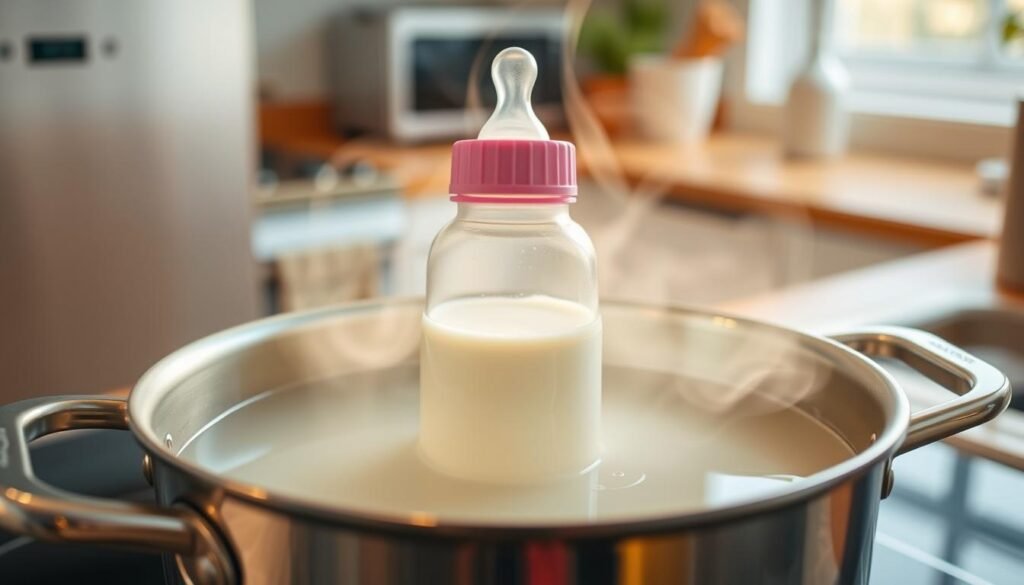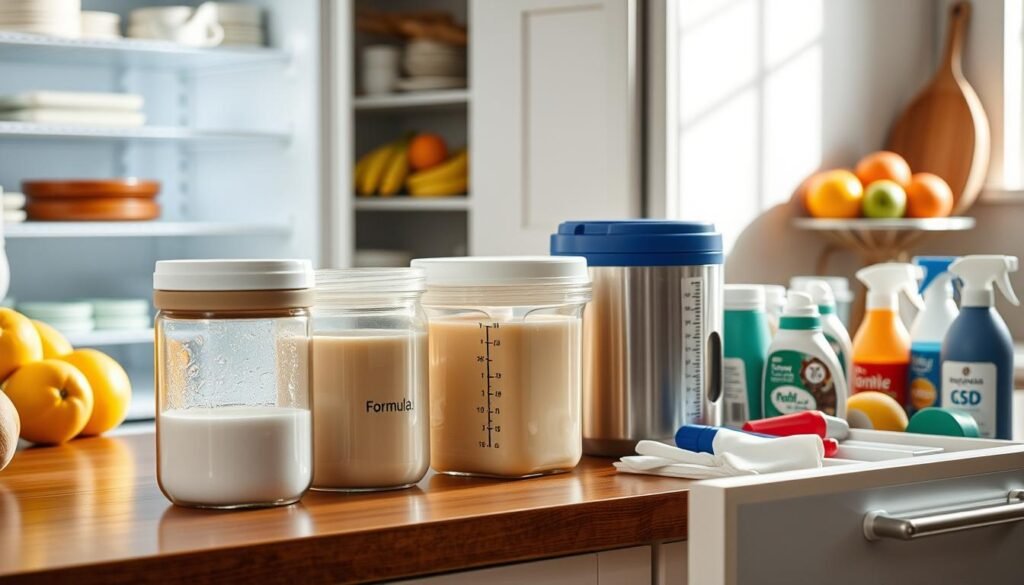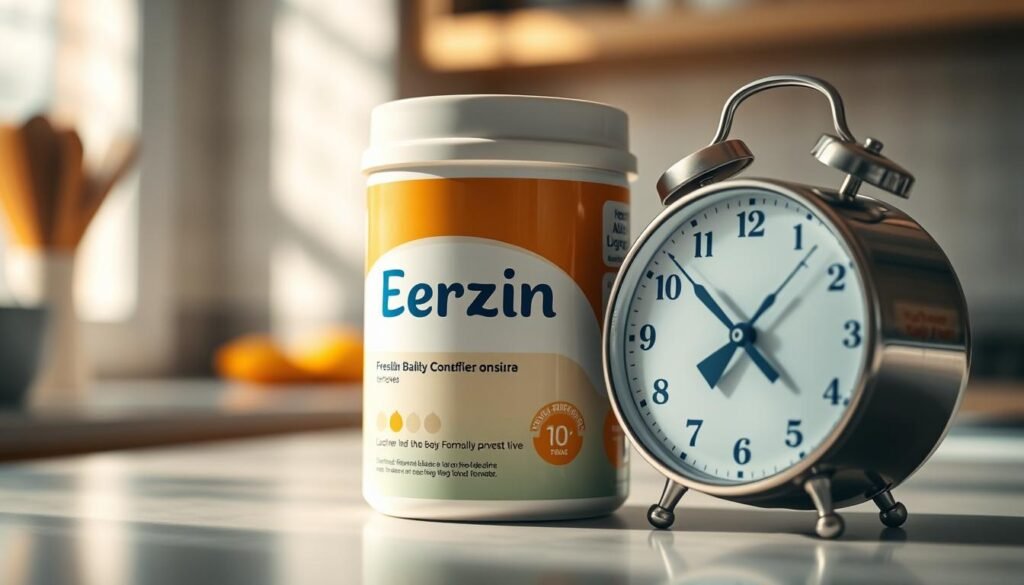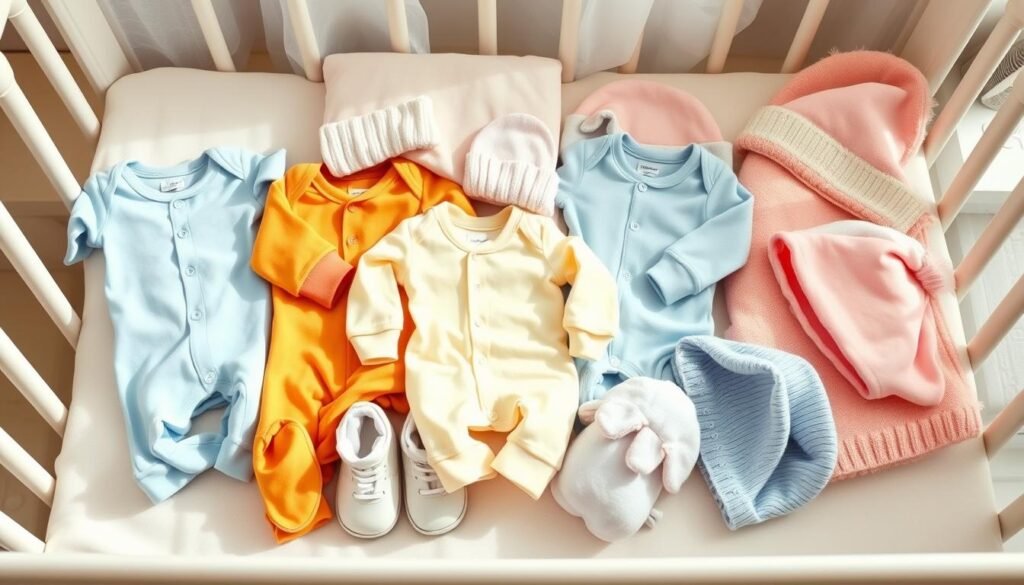As a parent, I always look for ways to use every drop of infant formula. It’s expensive and hard to get. Knowing how long formula lasts is key to keeping my baby safe and using what I have.
Many parents wonder how long formula stays good before it goes bad. It’s important to know when it expires to avoid health risks.
Formula can be a safety issue if it sits out too long. Learning how to store and handle it right is crucial. In this article, I’ll talk about the shelf life of baby formula. I’ll also share tips on how to keep it fresh and safe for my baby.
Understanding Baby Formula Shelf Life Basics
As a parent, knowing about baby formula shelf life is key. It ensures your baby’s formula stays fresh and safe. Always follow the formula storage tips from the manufacturer. A bottle of prepared but unused formula should not sit out for more than two hours to avoid bacterial growth.
To keep formula fresh, store prepared, unoffered bottles in the fridge for up to 24 hours. Unopened baby formula should be used within 30 days after opening. Proper handling and storage are crucial to extend formula lifespan and prevent contamination and spoilage.
Different Types of Formula and Their Storage Needs
Various baby formulas have different storage needs. For instance, powdered formula can last in the fridge for up to 24 hours if prepared but not used. Liquid ready-to-feed and concentrated formulas can last up to 48 hours in the fridge.
Factors Affecting Formula Longevity
Several factors can impact baby formula’s shelf life. These include temperature, handling, and storage conditions. Following proper formula storage tips is vital to prevent bacterial growth and contamination. Boiling water for a full minute before mixing with formula can kill harmful bacteria.
The Impact of Temperature on Formula Storage
Temperature is crucial for extending formula lifespan. Baby formula should not be stored in the freezer or refrigerator as humidity can affect its consistency and nutritional quality. Store unopened, sealed baby formula containers in the pantry until they reach the expiration date, which is usually 18 months to 2 years from the date of manufacture.
| Formula Type | Storage Requirements | Shelf Life |
|---|---|---|
| Powdered Baby Formula | Room temperature (up to 2 hours), Refrigerator (up to 24 hours) | Up to 30 days after opening |
| Liquid Ready-to-Feed Formulas | Refrigerator (up to 48 hours) | Up to 7-10 days after opening |
| Concentrated Formulas | Refrigerator (up to 48 hours) | Up to 7-10 days after opening |
How Long Does Formula Last Before It Goes Bad?
As a parent, knowing the shelf life of formula is key. It ensures your baby gets the right nutrition. The formula expiration date is crucial. It tells you if the formula is still safe to use.
Unopened formula can last up to 18 months to 2 years. But, once opened, it’s a different story. Here’s what you need to know:
- Prepared formula stays good at room temperature for 2 hours.
- After touching the baby’s lips, use or discard it within 1 hour.
- Powdered formula can stay in the fridge for 24 hours. Liquid and concentrated formulas can last up to 48 hours.
Always check the formula expiration date and store it right. This prevents spoilage and keeps your baby healthy. If you’re not sure, it’s safer to throw it away.
Knowing the shelf life of formula and storing it correctly is vital. Always check the formula expiration date. Use your best judgment for your baby’s nutrition.
| Formula Type | Storage Guidelines | Shelf Life |
|---|---|---|
| Powdered Formula | Room temperature: 2 hours, Refrigerator: 24 hours | Up to 30 days after opening |
| Liquid Ready-to-Feed Formula | Room temperature: 2 hours, Refrigerator: 48 hours | Up to 48 hours after opening |
| Concentrated Formula | Room temperature: 2 hours, Refrigerator: 48 hours | Up to 48 hours after opening |
Safe Storage Guidelines for Prepared Formula
Storing prepared formula safely is key to preventing spoilage and keeping it fresh. The American Academy of Pediatrics says you can store it in the fridge for up to 24 hours.
A mixed formula bottle is good for 2 hours at room temperature if not touched or heated. But, some brands say it’s safe for only 1 hour. Always check the brand’s instructions for specific guidelines.
Room Temperature Storage Guidelines
Formula that’s been prepared but not used yet is safe at room temperature for up to 2 hours. But, once a baby’s bottle is used, it must be finished or thrown away within 1 hour to avoid bacteria.
Refrigeration Best Practices
An unused bottle of formula mixed from powder can stay good in the fridge for up to 24 hours. Keep the fridge at 40°F (4.4°C) or lower. Don’t freeze the formula. Powdered formula can stay in the fridge for up to 24 hours. Liquid and concentrated formulas can last up to 48 hours in the fridge.
Freezing Formula: Is It Safe?
Freezing formula is not recommended because it can damage the nutrients and change the texture. Instead, keep sealed formula containers in a cool, dry place away from extreme temperatures.
| Formula Type | Storage Guidelines |
|---|---|
| Powdered Formula | Use within 30 days of opening, store in a cool, dry place |
| Liquid Ready-to-Feed Formula | Use within 48 hours of opening, store in the refrigerator |
| Concentrated Formula | Use within 48 hours of opening, store in the refrigerator |
By following these guidelines and using the right preservation methods, parents can keep their baby’s formula fresh and safe from spoilage.
The Complete Guide to Reheating Formula
Reheating formula safely is key to avoid bacterial growth and keep it fresh. Maximizing formula durability helps keep its nutritional value and safety. The CDC says you don’t need to reheat formula for your baby’s bottle. Cold or room temperature formula is safe for them.
To safely reheat formula, you can use a bottle warmer, a warm bottle bath, or the countertop method. But, avoid using a microwave because it can create hot spots that might burn a baby’s mouth. Here are some tips for reheating formula:
- Use a single-serve container of prepared liquid formula and reheat it only once per day.
- Never heat a second time if any portion goes unused.
- Discard partially consumed formula to prevent bacterial growth from a baby’s mouth.

By following these guidelines and maximizing formula durability, you can ensure your baby’s formula remains safe and fresh. Always check the manufacturer’s instructions for specific guidance on reheating and storing formula.
| Formula Type | Storage Time | Reheating Method |
|---|---|---|
| Powdered Formula | Up to 1 month | Bottle warmer or warm bottle bath |
| Liquid Ready-to-Feed Formula | Up to 24 hours | Countertop method or bottle warmer |
Signs Your Formula Has Gone Bad
As a parent, knowing when your baby’s formula has gone bad is crucial. This knowledge keeps your baby safe and healthy. The formula expiration date is important, but it’s not the only sign of spoilage.
Look for physical signs like changes in color, texture, or smell. If the formula smells or looks off, it’s best to throw it away. The shelf life of formula changes based on type and storage. But if you see any of these signs, it’s time to get rid of it:
- Changes in color or texture
- Unusual smells or odors
- Presence of mold or insects
- Unusual spots or sediment
Trust your instincts about your baby’s formula. If something seems off, don’t hesitate to discard it. Remember, the formula expiration date is just one thing to look at. Proper storage and handling can also extend the shelf life of formula.
Being aware of these signs and taking precautions ensures your baby’s formula stays safe and fresh. Always check the formula expiration date and follow storage guidelines to keep the shelf life of formula long.
My Tested Storage Tips for Maximum Freshness
To keep your baby’s formula fresh, follow important storage tips. Store the formula in a cool, dry place. Keep it away from sunlight and moisture. This helps keep the formula fresh and prevents bacteria from growing.
Here are some more tips for safe and effective formula storage:
- Always check the expiration dates on the formula cans before use.
- Use a clean and dry scoop to measure the formula powder.
- Store the prepared formula in the refrigerator at a temperature of 40°F (4°C) or below.
- Use the prepared formula within 24 hours of preparation.
By following these simple tips, you can keep your baby’s formula fresh and safe. This is key for their health. Always wash your hands before handling the formula. Also, clean and sanitize equipment regularly.

It’s also smart to label containers with the date and time of preparation. This helps avoid confusion. By following these guidelines, you can keep your baby’s formula fresh and safe. This is vital for their health and well-being.
| Storage Method | Temperature | Time Limit |
|---|---|---|
| Room Temperature | Up to 73°F (23°C) | 2 hours |
| Refrigerator | 40°F (4°C) or below | 24 hours |
Essential Safety Practices During Formula Preparation
As a parent, it’s crucial to follow proper formula preservation methods to ensure your baby’s formula stays fresh and safe. Never reheat formula, as bacteria can spread once your baby’s saliva mixes with it. The FDA says to use prepared infant formula within 1 hour from the start of feeding. Discard any remaining formula to prevent bacterial growth.
To prevent formula spoilage, it’s vital to follow safe handling and preparation techniques. Prepare the exact amount of formula your baby will eat in one feeding. Use disposable cups for feeding when access to clean water and suitable cleaning methods for bottles and nipples is limited. Warm the formula by placing the closed bottle in a warm water bowl for a few minutes. Never microwave formula, as it can create hot spots that can burn your baby’s mouth.
By following these essential safety practices and using proper formula preservation methods, you can help prevent formula spoilage prevention and ensure your baby’s formula stays fresh and safe. Always check the “Use By” date on the formula container. Follow the manufacturer’s instructions for preparation and storage.
- Use prepared infant formula within 1 hour from the start of feeding
- Discard any remaining formula to prevent bacterial growth
- Prepare the exact amount of formula your baby will eat in one feeding
- Use disposable cups for feeding when necessary
- Warm the formula by placing the closed bottle in a warm water bowl for a few minutes
By following these simple steps and using proper formula preservation methods, you can help keep your baby’s formula safe and fresh. This prevents formula spoilage prevention.
Conclusion: Ensuring Your Baby’s Formula Stays Fresh and Safe
Keeping your baby’s formula fresh and safe is key. Knowing the shelf life of different formulas is important. Also, following the right storage and reheating tips helps a lot. This way, your baby can enjoy every meal without worry.
The formula expiration date is just the beginning. How you store and handle the formula greatly affects its freshness. Always keep things clean, control the temperature, and use it on time. These steps help keep your baby’s formula fresh and full of nutrients.


